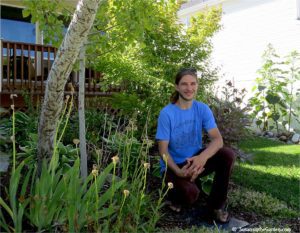Aug. 28 column: Permaculture

One of the nicest things about being a garden columnist is that I get to meet and learn from awesome gardeners. In my column today, I introduce you to Master Gardener/Master Composter Ryan Herring and learn about permaculture. Here’s a link to it in The Spokesman-Review: Permaculture goes beyond the garden to daily life. Or you can read my column below.
Ryan explained to me that permaculture isn’t just a “thing” — it’s a series of principles and ethics that help guide you through both gardening and a lifestyle that is environmentally sustainable.
He was also excited to share with folks about the upcoming Permaculture Convergence, which will be held in Tumtum, Wash. from Sept. 9-11. To learn more about it, be sure to visit their website at inlandnorthwestpermaculture.com/. There will be workshops on a variety of topics, hands-on activities, vendors, booths and kids activities.
Another important event he told me about is the Introduction to Permaculture series of classes, which will be presented by Jeremy Cowan PhD at Spokane County Extension. The classes run on Saturday mornings from Oct. 22 through Nov. 19. For more information, visit the Extension website. This is a great opportunity!
I hope you’ll enjoy reading about Ryan and how permaculture is an integral part of his life.
Column:
by Susan Mulvihill
Permaculture is a term gardeners occasionally hear but don’t necessarily understand its meaning. To better comprehend it, I met with someone who knows a great deal about it.
Ryan Herring is a Master Gardener and Master Composter/Recycler. But, more importantly, he holds a permaculture design certificate.
What is permaculture?
“Permaculture is a set of ideas with ethics and principles that go along with it,” he explained. “On a personal level, it involves incorporating everything I do: my lifestyle and the systems and ecosystems I live within. On one level, it involves seeing a function in nature and trying to replicate that in the rest of my life.”
He gave the example of watching the movement of water through a landscape.
“It’s changed my approach to how I shower and how I use water for washing dishes or clothes,” he said. “I’m always thinking about where that water goes and how I can reuse it. I used to be pretty mindless about it.”
A combination of the words “permanent” and “agriculture,” the term “permaculture” was initially coined by one its founders, Bill Mollison. The idea was to design productive systems for growing food. In addition, it encompasses ways to interact with our natural world in a sustainable way.
How Herring implements permaculture principles within his landscape
As Herring and I walked through his landscape, I was able to see how he puts these philosophies into practice. His primary areas of interest are soil and composting.
“I’m an organic gardener, even to an extreme,” he explained. “I avoid adding any fertilizer to my garden and instead add nutrients through composting. It creates a better environment for the plants and I get equal, if not more bountiful, crops from it. What I’m out here doing is creating more habitat for soil microbes to live in.”
When he and his family moved into his Spokane Valley home eight years ago, Herring wasn’t yet following permaculture practices. Both the front and back yards had large lawns. He quickly realized how much work maintaining them involved.
“It made me focus on what I was doing,” he said. “Was I creating a better environment and something purposeful? At that point, I started taking classes to learn more about gardening and composting.”
He is a firm believer in reusing and repurposing materials. His beds are edged with stones that were left over from construction sites. Herring has kept some lawn for his kids to play on. He uses the grass clippings as mulch and in his compost. He repurposes tree snags and branches to provide birds with places to perch.
There are many perennials and annuals planted throughout his yard to attract pollinators. He leaves sunflower heads in place during the winter to feed the birds. Combined plantings of annuals, perennials, shrubs and trees help the soil hold as much water as possible.
Herring grows a lot of plants through propagation. He also leaves spent flower heads on many plants so more will grow from them the following year.
By embracing permaculture philosophies, he has learned the most important concept of all.
“Don’t fight with nature,” he said. “Learn how to work with it instead.”

